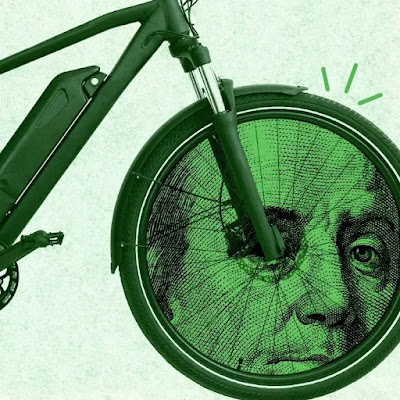Some American bike firms, like Brooklyn Bicycle Company, are deciding whether to absorb the price increases or pass them on to customers. Others, like Detroit Bikes and BCA, are calling for even higher tariffs and extending them to all imported bikes.
Trek and Kent--two bike companies rarely mentioned in the same breath, let alone the same blog post!--are contemplating yet another strategy which, really, shouldn't come as much of a surprise.
Trek is, arguably, the most prestigious mass-market American bike brand. (Specialized and Cannondale are probably Trek's chief competitors for this title.) Their highest-priced bikes are still made here, albeit with imported components. The rest of their bikes are made by sub-contractors that include Giant, which also sells its bikes under its own name.
Kent's offerings, in contrast, are at the bottom of the market and found, not in bike shops, but in big-box stores like Walmart and internet retailers. Some are sold, under license, bearing the Jeep, Cadillac and GMC brands. Although some of its bikes are assembled in South Carolina, their frames are made in China and Taiwan and assembled with components made in those countries.
So...Is Trek returning to its roots by returning its manufacturing to the US? Well...no. You're not going to see a revival of those nice lugged steel frames they made in Wisconsin during the '70's and '80's.
Likewise, Kent isn't going to build a factory in Parsippany, New Jersey (the location of its headquarters), or anywhere else in the good ol' You-Ess-Of-Ay!
No, they are not going to do what El Cheeto Grande told all of those laid-off blue-collar workers in Ohio and Michigan and Pennsylvania companies would do in the face of tariffs. Instead of making their wares in the country Trump thinks he can Make Great Again, they are talking about shifting their production to a country that isn't getting a tariff wall built around it.
If you are European, what I am about to say next will come as no surprise: That country is Cambodia.
The Southeast Asian kingdom is already the biggest supplier of bicycles to European Union countries. Most of the country's bike factories are in the north, near Vietnam--which some have called "the EU's China." If you buy, say, a backpack or jacket in Europe, it's more likely than not to have been made in Vietnam, just as the new bike is likely to be from Cambodia.
It will be interesting to see whether other American bike companies make similar moves. If anything, wages in Cambodia, Vietnam and other countries in the region are lower than they are in China. And some Cambodian bikes are already coming into the US--though, in far smaller numbers than bikes from China or Taiwan.





